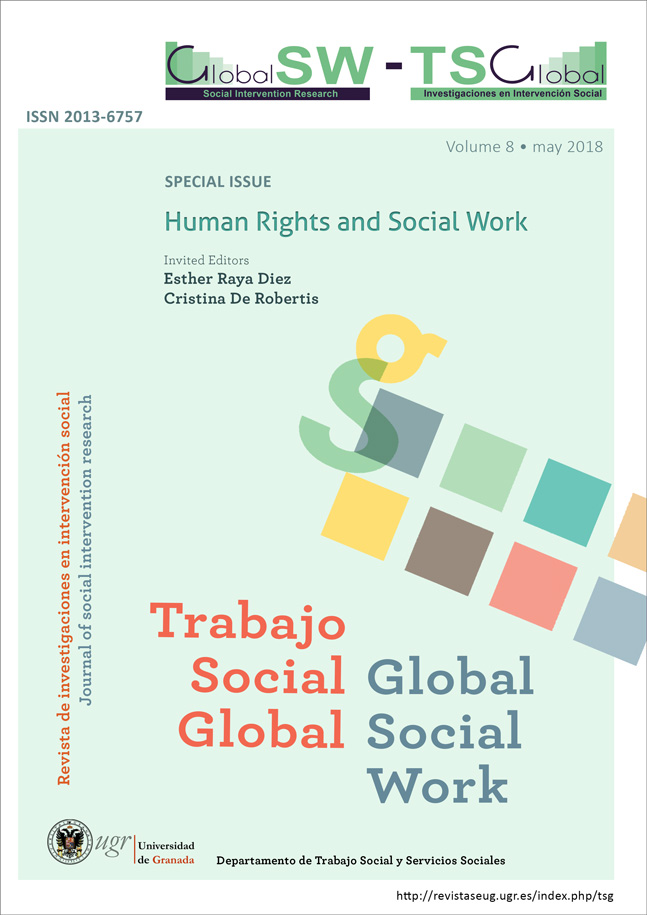Human and social rights, susceptible to permanent reinvention: an innovative look from the present in line with the past
DOI:
https://doi.org/10.30827/tsg-gsw.v8i0.6584Keywords:
Human Rights, innovation, Welfare stateAbstract
It is well known that Social Work defends the person’s autonomy thus favouring the incorporation in the environment and improving her-his opportunities. Nowadays, the word "innovation" acquires a key role in the structure of the States and political relations, particularly, in relation to intervention. Since human and social rights are always dealing with difficulties and structural pressures, those who defend these rights must have a constant innovative attitude. This attitude being the key point so as to achieve credibility within this current cult of the immediacy. So as to defend human rights, it is necessary to assume a humanising perspective having human dignity as referent, thus improving relationships in society. This is also found within the foundation of Welfare States, establishing rules that have improved the access to a fairer distribution of the wealth, targeting procedures and rights guaranteed in the public politics. A special way of looking is required to discover this line of continuity between past, present and future. The suggestions which are created "from the individual" orientated to promote social, economic, political and juridical structures "to the human beings" appear with an innovative potential, gathering a certain humanistic legacy that leads to build a more sustainable world.
Downloads
References
Ansuategui Roig, FJ. (2014). Los derechos sociales en tiempos de crisis. Algunas cuestiones sobre su fundamentación. En MªJ. Bermuz Benéitez y Manuel Calvo García (ed.). La eficacia de los derechos sociales (pp. 23 - 42). Valencia: Tirant lo Blanc.
Arenal C. (1861). La beneficencia, la filantropía y la caridad. Madrid: Imprenta del Colegio de sordomudos y de ciegos.
________ (1870). Exposición de motivos en La Voz de la caridad, nº 1.
Díaz, E. (1976). El sentido humanista del socialismo (estudio preliminar). Madrid: Castalia.
________ (1993). Fernando de los Ríos: la vigencia del socialismo humanista 1879-1949. Madrid: Fundación Españoles en el Mundo, D. L.
________ (1994). Los viejos maestros la reconstrucción de la razón. Madrid: Alianza.
________ (2010). La democracia en España. El legado socialista de la Ilustración. Nos queda la palabra. Madrid: Fundación Alternativas. Recuperado de http//www.fundacionalternativas.org
Ducpetiaux, E. (1843). De la condition physique et morale des jeunes ouvriers et des moyens de l´améliorer. Bruxelles: Meline, Cans et Compagnie.
___________ (1850). Mémoire sur le pauperisme dans les flandres. Bruxelles: M. Hayez.
Gatti de Gamond, Z. (1847). Paupérisme et association. Paris: La Librairie.
Godin, A. (1871). Solutions sociales. Paris: Le Chevalier éditeur-Guillaumin et Compagnie Editeurs.
Giménez Bertomeu, V.M. y Domenech López, Y. (2016). Investigación novel en trabajo social en España. En Esther Raya y Enrique Pastor (Coord.) Trabajo social, derechos humanos e innovación social (pp. 31-47). La Rioja: Thomson Reuters Aranzadi.
González Ordovás, MªJ. (2014). Globalización, espacio y derecho a la vivienda. En MªJ. Bermuz Benéitez y Manuel Calvo García (ed.) La eficacia de los derechos sociales (pp. 259-284). Valencia: Tirant lo Blanc.
Lacalzada de Mateo, M.J. (1996). Dios y Libertad (Memoria inédita de Concepción Arenal. Estudio preliminar, revisión y notas). Pontevedra: Museo de Pontevedra.
__________ (2012). Concepción Arenal. Mentalidad y proyección social. (3ª ed.) Zaragoza: Prensas Universitarias de Zaragoza.
__________ (2015). Fundamentos del Estado de Bienestar: la Reforma social (1843–1919). Zaragoza: Prensas Universitarias.
Miranda Aranda, M. (2004), De la caridad a la ciencia. Pragmatismo simbólico y Trabajo Social. Zaragoza: Mira Editores.
Monlau, P.F. (Dir.) (1858). El monitor de la salud de las familias y de la salubridad de los pueblos, Tomo I. Madrid: Carlos Bailly-Bailliere.
Pastor Seller, E. y Herrera Gutiérrez, Mª R. (2016). Los movimientos sociales: discusiones y agenda de investigación del trabajo social. En Esther Raya y Enrique Pastor (Coord.) Trabajo social, derechos humanos e innovación social (pp. 65 - 80). La Rioja: Thomson Reuters Aranzadi.
Raya Díez, E. y Montenegro Leza, S. (2017). Derechos Humanos en la práctica del Trabajo Social. En Esther Raya, Neus Caparros, Belén Lorente y Sagrario Anaut (coords.) Ciencia y Esencia en la práctica del Trabajo Social (pp. 277-296). Valencia: Tirant-Humanidades.
Sociétè d’Économie Charitable (1845). Annales de la charité. Revue mensuelle destinée à la discussion des questions et à l’examen des institutions qui intéressent les clases pauvres. Premiére année. Paris: Sociétè d’Économie Charitable.
Valette, A. (Mme). (1889). Oeuvre des Libérées de Saint-Lazare. Fondée en 1870. Reconnue d´utilité publique par décret du 26 janvier 1885. Aleçon: Impr. de F. Guy.
Vega Gutiérrez, A M. (Coord.). (2013). Derechos humanos; elementos para un nuevo marco conceptual. Cizur, Navarra: Thompson Reuters.
VVAA. (2008). Teoría de la Justicia y Derechos Fundamentales. Estudios en Homenaje a Gregorio Peces-Barba. Tres tomos. Madrid: Dykinson.
Worms, R. (1893). Revue International de Sociologie, nº 3, 359-361.
Downloads
Published
How to Cite
Issue
Section
License
Authors publishing in this journal agree to the following terms:
- Authors retain their copyright. They guarantee to this journal the right to a first publication of the work submitted to initiate the editorial process.
- Authors know that their work is published under a Creative Commons License which allows others to share it, with a recognition of the work's authorship and its initial publication in this journal.
- Authors share with Global Social Work explotation rights of the work that has been published in this journal, authorizing the execution of a free reproduction, distribution and public communication. Authors know that their work will be stored on servers and reproduced in digital format for inclusion in institutional repositories and databases that will facilitates free access to the full text of the work.
- Authors may distribute the version of the work published in this journal (for example, to an institutional repository or publish it in a book), with the explicit acknowledgment of its initial publication in this journal.
Copyright on the texts published in Trabajo Social Global -Global Social Work, as well as editorial policy of the journal refering to self-file and deposit in institutional or thematic repositories, are identified in the database





















